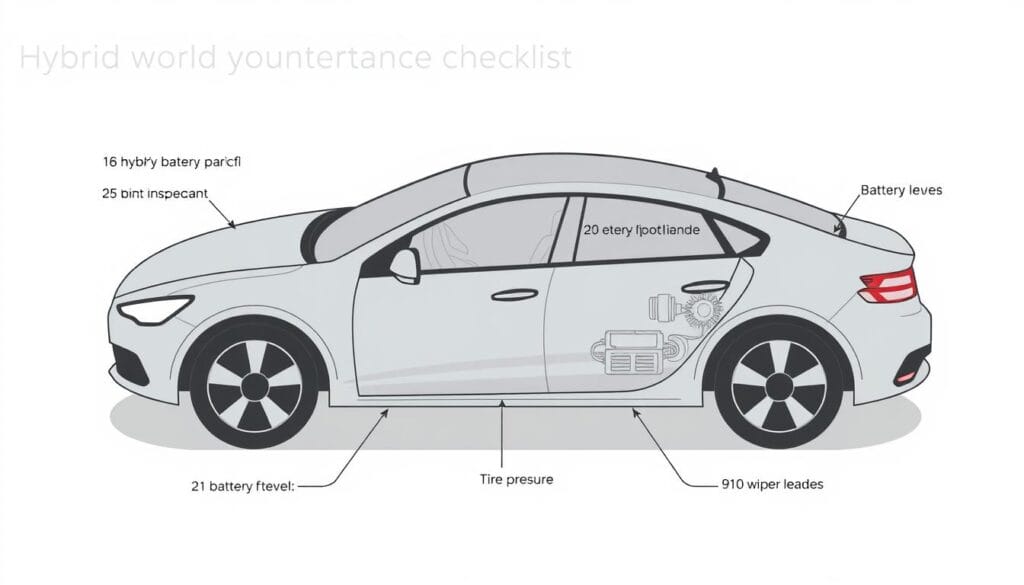Hybrid Oil Change Guide: When and How in 2025
As a hybrid vehicle owner, I learned early on that car care is different from gas cars. The world of hybrid maintenance can seem scary. But, with the right info, you’ll be a pro at your Hybrid Oil Change Guide.
Hybrid vehicle care needs precision and knowledge. Your hybrid’s engine is complex and needs special care. The 2025 world of hybrid maintenance has changed, making it key to know the latest techniques.
Modern hybrids like the Toyota Highlander and Hyundai TUCSON are amazing feats of engineering. They need specific care. With oil change times from 6,000 to 10,000 miles, keeping up with maintenance is vital. It ensures your car runs well and lasts longer.
Table of Contents
Understanding Hybrid Engine Oil Needs
Your hybrid vehicle is a mix of electrical and mechanical engineering. It needs special synthetic oil replacements. These oils work well with both electric and gasoline parts.
Hybrid cars work by combining electric motors and internal combustion engines. This setup requires special lubricants. They must handle different conditions and support green car care.
The Critical Role of Oil in Hybrid Performance
Oil does more than just lubricate in hybrid cars:
- It reduces friction between engine parts
- It helps cool the engine during power changes
- It protects the complex hybrid system
- It supports smooth energy conversion
Selecting Optimal Oils for Hybrid Engines
Look for these key traits in hybrid oil:
- High-temperature stability
- Strong protective qualities
- Works well with hybrid tech
- Low friction
Synthetic oils are the best choice for hybrids. They last longer and perform better than regular oils. Using top-notch synthetic oil keeps your hybrid running smoothly for years.
When to Change Oil in Your Hybrid
Knowing when to change your hybrid’s oil is key to keeping it running well. Hybrid cars need special care that’s different from gas cars.
Today’s 2025 hybrid models can go longer without an oil change. Services for fuel-efficient cars suggest these guidelines:
- Toyota Corolla Hybrid: Every 10,000 miles
- Toyota RAV4 Hybrid: Every 10,000 miles
- Toyota Highlander Hybrid: Every 10,000 miles
- Vehicles with heavy-duty tasks: Every 5,000 to 7,000 miles
Recommended Oil Change Intervals
The old rule of changing oil every 3,000 miles doesn’t apply to hybrids anymore. Synthetic oils and advanced engine technologies have made oil changes less frequent. Toyota advises oil changes for most hybrids every 7,500 to 10,000 miles.
“Regular maintenance is the key to keeping your hybrid running smoothly and efficiently.” – Automotive Expert
Signs Your Hybrid Needs an Oil Change
Look out for these signs that your hybrid needs oil:
- Dark or gritty oil appearance
- Engine noise or knocking sounds
- Dashboard warning lights
- Decreased fuel efficiency
Change your oil every six months, even if you haven’t hit the mileage mark. This keeps your hybrid’s engine in great shape and avoids expensive fixes.
Choosing the Right Oil for Hybrids
Choosing the right oil for your hybrid is key to keeping it running well. Modern hybrids need special oil to work at their best and last longer.
Hybrids are different from regular cars, needing special oil. The right oil helps you drive green and keeps your car running smoothly.
Synthetic vs. Conventional Oil
For hybrids, synthetic oil is the best choice. Here’s why:
- It gives better engine protection
- It lets you go longer between oil changes
- It works great in hot or cold weather
- It helps reduce wear on hybrid engines
Recommended Oil Brands for Hybrids
Here are some top oils for hybrids:
- Castrol EDGE Advanced – Meets HYSPEC hybrid standards
- Toyota Genuine Motor Oil – Made for Toyota hybrids
- Mobil 1 Advanced Fuel Economy – For modern hybrid systems
Most hybrids need 0W20 synthetic oil for the best protection and performance. Always check your car’s manual for the right oil to keep it green and running well.
Pro tip: Regular oil maintenance is key to keeping your hybrid efficient and avoiding expensive repairs.
Steps to Perform an Oil Change
Keeping your hybrid vehicle in good shape means regular oil changes. This ensures your car runs well and saves fuel. Knowing how to change oil can save you money and keep your car running smoothly.
Before starting, you’ll need to get the right tools and materials for your hybrid.
Essential Tools for Your Oil Change
- Wrench set (10mm socket recommended)
- Oil filter removal tool
- Jack and jack stands
- Oil drain pan (7-liter capacity)
- New oil filter
- Correct synthetic oil (SAE 0W-16 for most hybrids)
- Funnel
- Gloves and safety glasses
Step-by-Step Oil Change Process
- Warm up your hybrid engine for 5-10 minutes
- Safely lift the vehicle using jack stands
- Locate the oil drain plug underneath the vehicle
- Place the drain pan underneath the plug
- Remove the drain plug (using a 10mm socket)
- Allow oil to drain completely (approximately 30-45 minutes)
- Replace the drain plug, torquing to 23 lb-ft
- Remove and replace the oil filter
- Add new synthetic oil (4.5 liters)
- Check oil level with dipstick
“Proper maintenance is the key to extending your hybrid’s life and performance.” – Automotive Maintenance Expert
For low-emission vehicle maintenance, remember to dispose of used oil responsibly at a certified recycling center. Most service stations accept used motor oil for proper disposal.
Pro tip: Always consult your vehicle’s specific manual, as oil change requirements can vary between hybrid models.
Environmental Considerations for Hybrid Oil Changes
Hybrid car owners lead the way in green driving. They care about more than just saving fuel. They also focus on eco-friendly car care during regular checks.
Eco-Friendly Oil Disposal Practices
It’s important to dispose of used motor oil the right way. This protects our planet. Recycling centers and service stations have special spots for used oil. Here’s how to do it right:
- Collect used oil in clean, leak-proof containers
- Never pour oil down drains or onto the ground
- Transport oil to certified recycling centers
- Avoid mixing oil with other chemicals or fluids
Benefits of Using Renewable Oils
Renewable oils are great for the environment in hybrid cars. Biodegradable oil options cut down on carbon emissions. They also keep your engine running smoothly.
Renewable oils offer many benefits:
- Less petroleum use
- Lower greenhouse gas emissions
- Better engine protection
- Support for eco-friendly making
Choosing eco-friendly car care helps your hybrid and the planet. Renewable oils and proper disposal show how small actions can make a big difference.
Hybrid Maintenance Beyond Oil Changes
Keeping your hybrid vehicle in top shape is more than just oil changes. It’s about taking care of all its systems for long-term performance. This approach is key to green transportation upkeep.

Hybrid battery conditioning is vital for your vehicle’s health. Toyota hybrids are built to be easy to maintain. But, with the right care, you can make them last longer and run more efficiently.
Key Maintenance Components to Monitor
- Tire pressure and rotation every 5,000 miles
- Brake fluid flush at 30,000-mile intervals
- Hybrid battery system checks
- Electric motor inspections
- Spark plug replacements
Regular maintenance keeps your vehicle running well. It also helps keep your warranty and resale value intact.
| Maintenance Task | Recommended Interval | Purpose |
|---|---|---|
| Tire Rotation | Every 5,000 miles | Ensure even wear and optimal fuel efficiency |
| Brake Fluid Flush | Every 30,000 miles | Prevent corrosion and maintain braking power |
| Hybrid Battery Check | Every 30,000 miles | Prevent premature battery failure |
Proactive maintenance is the key to keeping your hybrid running smoothly and efficiently.
Tip: Always use genuine manufacturer parts to ensure compatibility with your hybrid’s specialized systems.
How to Identify Oil Leaks in Hybrids
Finding oil leaks early is key to keeping your hybrid running well. It also stops expensive engine damage. Hybrid care means watching fluid systems closely. Even small leaks can hurt your car’s fuel efficiency.
Spotting oil leaks in hybrids can be hard. They start small but can grow into big problems if ignored.
Common Causes of Oil Leaks
- Degraded engine gaskets
- Worn seal connections
- Cracked oil pan
- Loose oil filter
- Damaged valve cover
Steps to Take if You Spot a Leak
- Check for dark spots under your vehicle
- Look for burning oil smell
- Inspect oil levels regularly
- Clean the suspected leak area
- Consult a professional mechanic
Watch for these signs of leaks. A small leak today could mean a major repair tomorrow.
| Leak Location | Potential Cause | Recommended Action |
|---|---|---|
| Under Engine | Gasket Failure | Immediate Professional Inspection |
| Near Oil Filter | Loose Connection | Tighten or Replace Filter |
| Oil Pan Area | Physical Damage | Repair or Replace Oil Pan |
Regular care for your hybrid can stop oil leaks. Fixing problems fast keeps your car running well and lasts longer.
The Role of Oil Filters in Hybrids
Oil filters are key to keeping your hybrid’s engine healthy. They keep out harmful stuff and help your engine run well. Knowing how they work helps your hybrid last longer.
Hybrid cars need special oil filters, unlike regular cars. These filters are vital for keeping your engine safe and running smoothly.
When to Replace Your Oil Filter
Toyota says to change your oil filter every 10,000 miles or a year. Look out for signs like:
- Decreased engine performance
- Visible oil contamination
- Unusual engine noises
- Warning lights on the dashboard
Choosing the Right Oil Filter for Your Hybrid
Picking the right oil filter is important for your hybrid’s health. OEM filters are made just for your car.
| Vehicle Model | Oil Filter Part Number | Recommended Change Interval |
|---|---|---|
| Toyota Highlander Hybrid | 90915-YZZF2 | 10,000 miles or annually |
| Toyota Prius | 04152-YZZA1 | 10,000 miles or annually |
Pro tip: Always check your car’s manual or talk to a certified hybrid tech to pick the right oil filter.
Proper oil filter care is a smart move for your hybrid’s long-term health and performance.
Myths About Oil Changes in Hybrid Vehicles
Many people think wrong about how to take care of hybrid cars. It’s important to know the truth to keep your hybrid in top shape.

Let’s look at some common myths about oil changes for hybrids and clear up the confusion:
- Myth: Hybrids never need oil changes
False. Hybrids may go longer between oil changes, but they need it just like any car. The engine needs clean oil to work right.
- Myth: Oil change intervals are the same as traditional vehicles
Not quite. Cars like Toyota hybrids can go about 10,000 miles or 12 months without oil changes. That’s longer than regular cars.
- Myth: Electric driving means no oil maintenance
Incorrect. Even when driving electric, the gasoline engine needs regular oil changes. This keeps it running well and prevents damage.
Understanding Hybrid Oil Change Realities
Looking after a hybrid car is different from traditional cars. Synthetic oil helps keep it running longer and needs less frequent changes. Most hybrids need oil changes twice a year, based on how you drive and what the maker says.
Pro tip: Always check your car’s manual for the right oil change schedule.
Hybrid cars mix electric and gasoline tech for better fuel use and lower upkeep. But, they need careful care to last long and perform well.
Cost Considerations for Hybrid Oil Changes
Understanding the costs of hybrid vehicle maintenance is key. It helps you make smart choices about your car’s upkeep and driving habits.
Hybrid cars can save you money over time. Even though they might cost more to maintain at first, they offer great value in the long run.
Breakdown of Hybrid Oil Change Expenses
The cost of oil changes for hybrids depends on several things. Here’s a detailed look:
- Synthetic oil: $50-$75 per change
- Oil filter replacement: $15-$30
- Labor costs: $30-$100
Money-Saving Strategies for Oil Changes
Smart owners can cut down on maintenance costs. Here are some tips:
- Learn basic DIY maintenance skills
- Compare prices between dealerships and independent mechanics
- Follow recommended maintenance schedules
| Maintenance Type | Estimated Cost | Potential Savings |
|---|---|---|
| Professional Oil Change | $95-$205 | Standard rate |
| DIY Oil Change | $30-$75 | Up to 60% savings |
“Preventative maintenance is the key to long-term hybrid vehicle cost efficiency.” – Automotive Maintenance Expert
Knowing these costs helps you keep your hybrid running well. It also keeps your maintenance costs down.
Professional Oil Change Services for Hybrids
Dealing with hybrid cars needs special skills. While some like to do it themselves, getting a pro to change the oil is better. They know how to take care of hybrid cars in a way that’s more than just oil changes.
Benefits of Using a Professional Service
Getting your hybrid car serviced by a pro is a big plus. They have skills and tools that help keep your car running well. Here’s why:
- They can spot and fix problems with hybrid systems.
- They have the right tools for the job.
- They really get how hybrid engines work.
- They check all parts, not just the oil.
Finding a Trustworthy Mechanic
Finding the right mechanic is important. Here’s how to pick the best for your hybrid:
- Look for certifications from the car maker.
- Check if they’re a dealership or an independent shop.
- Ask for service records and be open about costs.
- Compare what different shops offer.
| Certification Level | Expertise | Recommended for Hybrids |
|---|---|---|
| ASE Certified | Advanced Automotive Training | High |
| Manufacturer Trained | Brand-Specific Technical Knowledge | Excellent |
| Hybrid Specialist | Dedicated Hybrid System Understanding | Optimal |
Choosing professional care for your hybrid car is smart. It keeps your car running great and saves the planet.
Planning Ahead for 2025 Hybrid Oil Changes
Hybrid technology is moving fast, and so must your car care. The 2025 cars will bring new chances for hybrid owners to keep their vehicles in top shape. Car makers are making smarter systems that need careful care and precise maintenance.
Modern hybrids like the Toyota Prius Prime and RAV4 Prime have better electric ranges. They go up to 42-44 miles on electric power alone. These cars need special care to keep them running well.
Toyota’s warranty covers hybrid parts for a long time, up to 150,000 miles. This shows how important regular checks and expert service are. Keeping up with new hybrid tech and service times will keep your car running smoothly for years.
Future hybrids will likely need less maintenance. Knowing your car’s needs and getting help from certified techs is key. This will help your hybrid last longer and perform better in the changing world of green cars.







